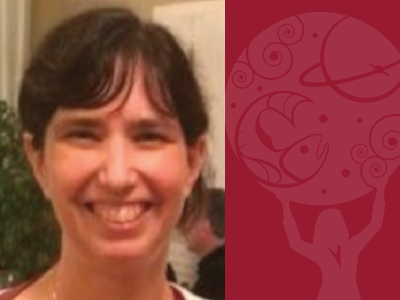“My AstroPassion is technical challenges that bring us where no human has been before.”
Marie-Josée's Biography
Dr. Potvin graduated from École Polytechnique de Montréal in Physics Engineering in 1990. She worked for a year and then went on to obtain a master degree in Mechanical Engineering at Queen’s University in 1994, and a Ph.D. in Mechanical Engineering at McGill in 2001. When she started her master degree, her daughter was 6 weeks old, and when she graduated she was pregnant of her third child. She took a year off as this was a difficult pregnancy and when she started her Ph.D., the children were 3 years and a half, 2 years old, and six months old! Her Ph.D. was done in collaboration with the Canadian Space Agency, which led her to take a position as Instructor to the Astronauts towards the end of her Ph.D. (Oh, and a fourth child had arrived by then!) Nearly a year after, she switched back to research by taking a position in Space Technologies, also within the Canadian Space Agency, and since then she’s been responsible for several files, from ensuring structures and mechanisms survive the lunar or martian environments to fostering links between industry and academia to build a stronger Canadian space workforce and economy.
Engineer, Canadian Space Agency, Saint-Hubert, Québec
My title is Engineer. I guess we like to keep it plain and simple, but I’m doing lots of cool stuff, from studying composite materials for the lunar environment to techniques to repair the structure of the Canadarm2, to building networks of industrials and academics in the space domain. I’m also responsible for the training of young engineers. They work under my supervision for 2 years and I ensure they are exposed to various technical challenges, but also become very apt at dealing with corporate issues.
The Canadian Space Agency oversees Canadian space projects such as the construction and operation of satellites or the Canadarm2. It also stimulates the development of knowledge and capacity in Canadian industries and academic institutions in order to obtain vibrant and successful industry and academic sectors.
I enjoy all technical challenges and working with people. Being part of a team that pulls together and delivers brings me great satisfaction.
I like them all. I’m the kind of person who lives intensely the present moment. I keep amazing memories of my time as an instructor to the astronauts, but also of my time on the technical team of HIFI, an instrument we were delivering for the Herschel satellite, and of every single research project where I worked with my students.
Every time we understand something from a technological point of view, we make something possible, and then academics get more scientific data from a functioning satellite, or industrials are able to bid and win a contract and create high quality jobs that will deliver satellites providing high quality data. I’m part of a huge undertaking, which is using space for the good of humanity, that being communications, safety, greater knowledge of the universe, or better understanding of climate change. It’s something to be proud of.
Life is still tough for women in the space domain. Studies show that as soon as a woman joins an engineering team, the work of the whole team is deemed ‘easy’. As a result, women have to spend a considerate amount of time convincing everyone around them that their work is valuable. This prevents them from growing to their full potential and also deprives the industry they are working for of their full abilities. My hope resides in young men. They are much more aware of these unconscious biases. I hope we will be further along the road in 25 years and women’s work will be more valued. In the mean time, I mentor many young women in engineering to cheer them along the way and help them realise they’re not the issue and they have to hang in there.
Seek as much technical work as you can. Don’t be afraid. Resist the temptation of organisations to push you towards project management. Project management is fine, but not early in your career. You must first build your reputation as a good, competent, highly technical engineer. And then, if things get rough, talk to older female engineers and realise you might not be the issue, it might well be the culture.
[/toggle]


